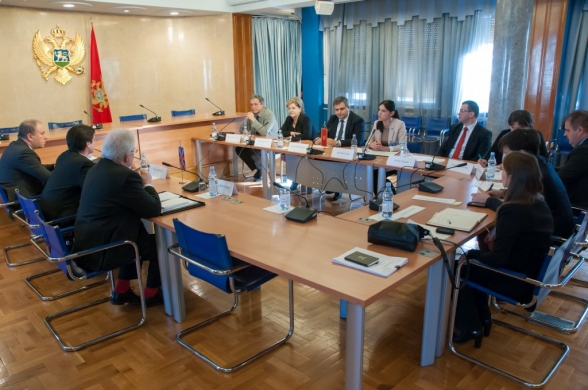Members of the Committee on European Integration today have met with Mr Paul Gaskell, Head of Western Balkans and Enlargement Department in Foreign and Commonwealth Office, in order to discuss European and Euro-Atlantic integration of Montenegro.
The meeting was marked by a discussion on perspectives of Montenegro’s membership to the EU and NATO, and Committee members, each from their own political corner, presented key aspects of the integration process.
Chairperson of the Committee Mr Slaven Radunović referred to Committee’s activities shortly, saying that within parliamentary dimension of the negotiation process, the Committee represents an umbrella body with very important oversight role. With regard to that, Mr Radunović says that so far – by consensual deciding of Committee members – seven proposals for amendments to the negotiation positions have been adopted, and that those proposals become an integral part of final version of the positions. The importance of the mentioned lies in the fact that regional countries have never changed any of the proposed positions, Mr Radunović concluded. Pointing out to the importance of inclusivity and comprehensiveness of the negotiation process, he adds that amending of positions is certainly influenced by opinions of interested public, stated during public debates, organised by the Committee shortly before the sittings, at which the mentioned documents are discussed.
Voicing pleasure over the visit to Montenegro, Mr Paul Gaskell emphasises that the United Kingdom remains devoted to providing support to Montenegro for EU and NATO integration. Aware of the fact how reforms can be painful for a society, Mr Gaskell stresses that the Committee should take care of the citizens’ interests, what is its role. He was particularly interested in challenges that Montenegro has been facing with in the accession process and key priorities of the state during 2015.
Committee members informed the guest about the fact that Montenegro’s integration process to the EU is supported by all parliamentary parties, and that the broad consensus contributes to stronger dynamics of the process. However, when it comes to NATO integration, there are different positions not only about the membership but also about the manner of deciding whether to acquire membership. With regard to priorities of the European integration process, the need for making additional efforts was emphasised, with the aim of providing measurable results particularly in the part of implementing the laws and providing the rule of law. Members agreed that implementation of reforms is complex, but also necessary for the EU membership.
At the end of the meeting, Mr Paul Gaskell thanked the Committee members on constructive discussion and voiced pleasure over the fact that lively discussion has been lead in the Parliament of Montenegro regarding Montenegro’s perspectives, and its developmental path, both in economic and political sense. Regardless of the fact that European integration is important step towards development of a state, the spirit of visible reforms and hard work should be also kept after joining the European Union, Mr Gaskell concluded.
On behalf of the Committee on European Integration, the meeting was attended by the Committee Chairperson Mr Slaven Radunović, Deputy Chairperson Ms Marija Maja Ćatović as well as Committee members: Mr Genci Nimanbegu and Mr Koča Pavlović. Mr Goran Tuponja attended the meeting as a substitute to the Committee member Ms Azra Jasavić. The meeting was also attended by the Ambassador of the United Kingdom to Montenegro Mr Ian Whitting, who accompanied the guest.
The said meeting represents Mr Gaskell’s return visit, since members of the Committee on European Integration paid an official visit to the United Kingdom two years ago.









